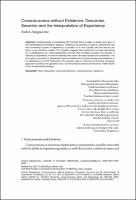Chapter Consciousness without Existence: Descartes, Severino and the Interpretation of Experience
| dc.contributor.author | Sangiacomo, Andrea | |
| dc.date.accessioned | 2023-11-27T17:12:34Z | |
| dc.date.available | 2023-11-27T17:12:34Z | |
| dc.date.issued | 2023 | |
| dc.identifier | ONIX_20231127_9791221501698_9 | |
| dc.identifier.uri | https://library.oapen.org/handle/20.500.12657/85599 | |
| dc.description.abstract | Consciousness is connected with the fact that a subject is aware and open to the manifestation of whatever appears. Existence, by contrast, is used to express the fact that something is given in experience, is present, or is real. Usually, the two notions are taken to be somehow related. This chapter suggests that existence is at best introduced as a metaphysical (or meta-experiential) concept that inevitably escapes the domain of conscious experience. In order to illustrate this claim, two case studies are considered. The first case is provided by Descartes’s famous treatment of consciousness and existence in his Meditations on First Philosophy. The second case is meant to contrast the Cartesian approach by taking the opposite route, as delineated by Emanuele Severino (1929–2020) in his ‘fundamental ontology’. | |
| dc.language | English | |
| dc.relation.ispartofseries | Knowledge and its Histories | |
| dc.subject.other | René Descartes | |
| dc.subject.other | Emanuele Severino | |
| dc.subject.other | consciousness | |
| dc.subject.other | existence | |
| dc.title | Chapter Consciousness without Existence: Descartes, Severino and the Interpretation of Experience | |
| dc.type | chapter | |
| oapen.identifier.doi | 10.36253/979-12-215-0169-8.10 | |
| oapen.relation.isPublishedBy | bf65d21a-78e5-4ba2-983a-dbfa90962870 | |
| oapen.relation.isbn | 9791221501698 | |
| oapen.series.number | 1 | |
| oapen.pages | 30 | |
| oapen.place.publication | Florence |

